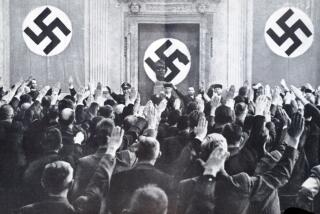But Failure to Punish Lesser Nazis Is Also Noted : U.S. War Criminal Effort Praised
- Share via
The United States did a good job of bringing Nazi war criminals to justice after World War II but failed by allowing lesser figures in the Third Reich into the country to work for the CIA, an Israeli professor said.
“The main argument against the U.S. government has to do with the former Nazi collaborators who were admitted into the country without a check of their past and who worked for the CIA after the war,” explained Shlomo Aronson, a professor of political science at Hebrew University in Jerusalem.
“Lithuanians, Polish, people from the Ukraine, people like (Andrija) Artukovic, those were the ones recruited by the CIA. This is absolutely true,” he said.
Artukovic, an elderly Yugoslav accused of masterminding the slaughter of more than 700,000 Serbs, Jews, Gypsies and orthodox Christians in Croatia during World War II, has been ordered extradited to Yugoslavia for the alleged offenses. He is awaiting an appeal of the ruling at a federal hospital in Missouri.
Military Tribunal
Aronson took part in a three-day conference this week at Claremont McKenna College in Pomona on the 1946 international military tribunal at Nuremberg, which convicted 22 people and hanged 13 of them for Nazi war crimes.
Both Aronson and Whitney Harris, a Nuremberg prosecutor, dismissed recent speculation that the U.S. role in the Nuremberg trials may have allowed major Nazi war criminals to escape justice.
“I think the U.S. did the best it could in tracking them and bringing them to justice,” Harris said. “There was a gigantic effort undertaken.”
“There was no intentional policy of letting these people get away with it,” Aronson insisted.
“On the contrary, there were problems in apprehending them. Some, like (Adolph) Eichmann and (Dr. Josef) Mengele escaped right after the surrender,” he noted.
‘Angel of Death’
Mengele, a former SS major nicknamed “The Angel of Death” for his role in selecting gas chamber candidates at the Auschwitz concentration camp, recently became the focus of attention after the Simon Wiesenthal Center for Holocaust Studies disclosed U.S. intelligence files showing a possible U.S. contact with Mengele after the war.
Some critics have claimed that U.S. officials knew where Mengele was and failed to track him down and put him on trial for his war crimes.
“Many people suspect he is in Paraguay,” Aronson said. “The U.S. knew about him in the 1960s, when he was involved in drug trafficking in South America, but did nothing.”
Aronson also claimed that Heinrich Mueller, who headed the Gestapo from the mid-1930s until the end of the war, is “alive and well” and lamented that an international manhunt has failed to locate him.
‘Lesser People’
Harris characterized Mengele and Eichmann as “lesser people” in Hitler’s regime, saying they would not have been major defendants at Nuremberg. He commended the U.S. for its role in finding and trying hundreds of other lesser Nazi war criminals at Nuremberg after the first big military tribunal.
“In all, more than 1,600 people were brought to trial by U.S. military tribunals after the main trial,” he said. “A conscientious effort was made, and no impediment was put before anyone in trying to track these people down.”
Of the 1,600 tried, he said, 1,090 were sentenced and 426 were put to death.
More to Read
Sign up for Essential California
The most important California stories and recommendations in your inbox every morning.
You may occasionally receive promotional content from the Los Angeles Times.










